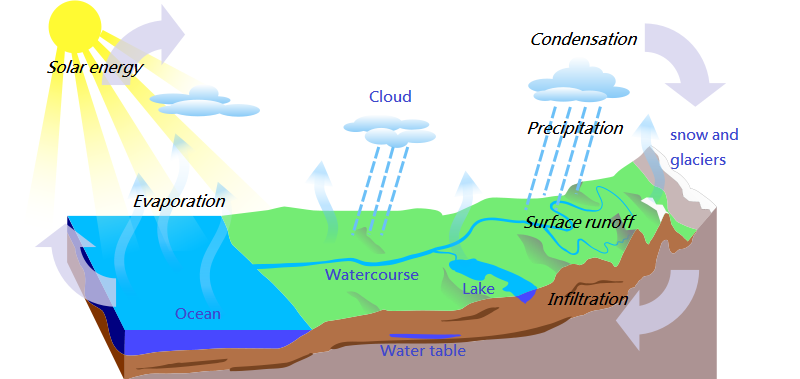
Explain water cycle with a suitable diagram?
Answer
571.8k+ views
Hint:The water cycle is the process of recycling the water within the ecosystem. There are different stages of the water cycle in which the whole process is carried out. The processes are evaporation, condensation, precipitation and deposition.
Complete step by step answer:Water cycle is defined as the biogeochemical cycle which involves circulation of water by different processes in different levels within the ecosystem.
The diagram of the water cycle is shown below.

The four main stages of the water cycle are shown below.
1. Evaporation: Evaporation is the initial stage of the water cycle. In this process, the water present in the water bodies gets heated in presence of sunlight and changes its state from liquid to vapour and mixes up with the air.
2. Condensation: In the condensation process, the vapours formed from the evaporation process loses its thermal energy and changes its state from vapours to liquid and results in the formation of clouds.
3. Precipitation: In this process, the clouds form water droplets which fall as rain, snow or hail back to the earth by the influence of gravity.
4. Deposition: This is the final stage of the water cycle. In this the water vapours which fall back to the earth in the form of rain and snow move to the different water bodies like rivers, oceans, lakes.
This whole process takes place in the form of a cycle, that’s why it is known as a water cycle.
Note:Water cycle is also called a hydrological cycle or hydrologic cycle. In the whole process of water cycle, the water is present in its all forms that are solid, liquid and gaseous.
Complete step by step answer:Water cycle is defined as the biogeochemical cycle which involves circulation of water by different processes in different levels within the ecosystem.
The diagram of the water cycle is shown below.

The four main stages of the water cycle are shown below.
1. Evaporation: Evaporation is the initial stage of the water cycle. In this process, the water present in the water bodies gets heated in presence of sunlight and changes its state from liquid to vapour and mixes up with the air.
2. Condensation: In the condensation process, the vapours formed from the evaporation process loses its thermal energy and changes its state from vapours to liquid and results in the formation of clouds.
3. Precipitation: In this process, the clouds form water droplets which fall as rain, snow or hail back to the earth by the influence of gravity.
4. Deposition: This is the final stage of the water cycle. In this the water vapours which fall back to the earth in the form of rain and snow move to the different water bodies like rivers, oceans, lakes.
This whole process takes place in the form of a cycle, that’s why it is known as a water cycle.
Note:Water cycle is also called a hydrological cycle or hydrologic cycle. In the whole process of water cycle, the water is present in its all forms that are solid, liquid and gaseous.
Recently Updated Pages
Master Class 9 General Knowledge: Engaging Questions & Answers for Success

Master Class 9 Social Science: Engaging Questions & Answers for Success

Master Class 9 English: Engaging Questions & Answers for Success

Master Class 9 Maths: Engaging Questions & Answers for Success

Master Class 9 Science: Engaging Questions & Answers for Success

Class 9 Question and Answer - Your Ultimate Solutions Guide

Trending doubts
Difference Between Plant Cell and Animal Cell

Fill the blanks with the suitable prepositions 1 The class 9 english CBSE

Who is eligible for RTE class 9 social science CBSE

Which places in India experience sunrise first and class 9 social science CBSE

What is pollution? How many types of pollution? Define it

Name 10 Living and Non living things class 9 biology CBSE




